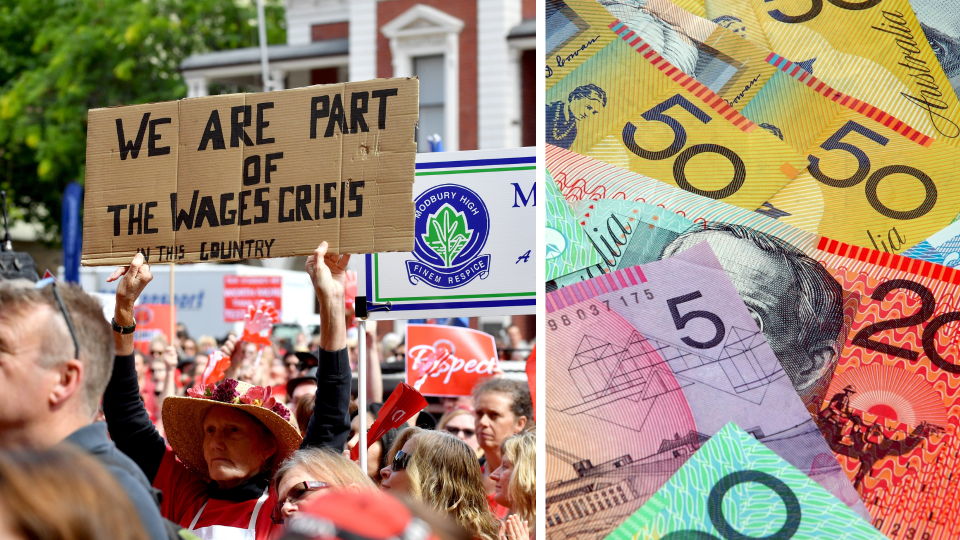Crumbling enterprise agreements crushing wage growth

The number of enterprise agreements in private Australian businesses have plummeted in the last five years, bringing wage growth down with them, new research reveals.
The number of Australian employees covered by an enterprise agreement (EA) has fallen from 19 per cent in 2013 to just 12 per cent last year, a report released today by the Centre for Future Work has found.
And this drop will have major consequences for wages.
“The accelerated collapse of enterprise bargaining in the private sector has been a key cause of the unprecedented weakness in wage growth experienced in Australia since 2013,” report author Alison Pennington said.
“When workers have no collective voice or collective bargaining power, they have no chance of successfully negotiating better wage increases from their employers.”
Hold up, what’s enterprise bargaining?
Enterprise bargaining is a negotiation process between an employer and employees.
It’s generally an agreement which benefits employees through incentives like above-award pay and employers through productivity or workplace trade-offs. Most EAs are negotiated with a union representative present.
The idea is that both parties benefit.
However, the “dramatic retrenchment” in the collective bargaining regime has wiped this away.
“The flip side of this coin has been a noted increase in the proportion of Australian workers whose pay and conditions are set according to the minimum standards of Modern Awards,” Pennington noted.
Why has there been a decline in the amount of people covered?
Retail trade and the agriculture, forestry and fishing industries have seen the largest declines in workers covered by EAs, down 82 per cent and 75 per cent respectively.
It’s the same story across the fast food and supermarket sectors.
The decline is due to a “perfect storm” of factors, Pennington said.
Many existing EAs are not being renewed upon expiration, while the number of newly-negotiated agreements has spiralled from 2,000 in 2010 to just 68 last year.
At the same time, employers are increasingly terminating their EAs.
What does it mean?
Softer wage growth, according to Pennington. Wage growth for private sector workers covered by an EA has historically been higher than their uncovered counterparts, she explained.
Nevertheless, this filtered out into other areas of the workforce.
“But with fewer workers covered by EAs, the impact of this ‘union wage growth advantage’ on overall wage trends is muted; overall average wage increases are suppressed, and fewer workers can count on secure, above-inflation wage increases.”
Essentially, more of us will be receiving the minimum award payable.
In fact, the research indicates only 2 per cent of private sector workers will be covered by an EA by 2030.
“It is no exaggeration to conclude that collective bargaining in private businesses will go extinct in coming years if these devastating trends are not reversed,” Pennington warned.
Big businesses receiving Christmas outrage
The research comes just days after angry Woolworths staff and customers hit out at the supermarket’s plans to have staff work on Christmas day.
The supermarket shut down over previous Christmas days but was stung after reports it was seeking permission from the Department of Industrial Relations to allow staff to work Christmas day this year. The staff would be replenishing stock for Boxing Day.
Branch secretary of retail workers’ union SDA Bernie Smith told Yahoo News the government should reject the submission.
“This year thousands of people will have to work over Christmas. Boxing Day is bad enough, we want that returned to the people of NSW,” he said.
“Woolworths has gone one step further and wants thousands of workers behind closed doors on Christmas Day.”
Woolworth’s claims that the work was voluntary were also considered dubious.
“There will be real pressure on people, casual and part-timers. Those at the highest level of the company say it’s voluntary but as it goes down the line the pressure to work becomes immense.”
Qantas has also backed down from a controversial Christmas staffing proposal. The airline had invited staff to volunteer unpaid at the check-in, auto-bag drop and arrivals hall over the busy Christmas period.
The proposal was slammed as demeaning to the paid workers who staff those areas. Critics also described the move as greedy given the company’s latest $980 million profit.
Make your money work with Yahoo Finance’s daily newsletter. Sign up here and stay on top of the latest money, news and tech news.
Now read: This is Airbnb’s impact on Aussie housing markets
Now read: This is what big companies need to do to stop losing disengaged staff
Now read: How to MAKE money from Labor’s plan to change negative gearing

 Yahoo Finance
Yahoo Finance 
